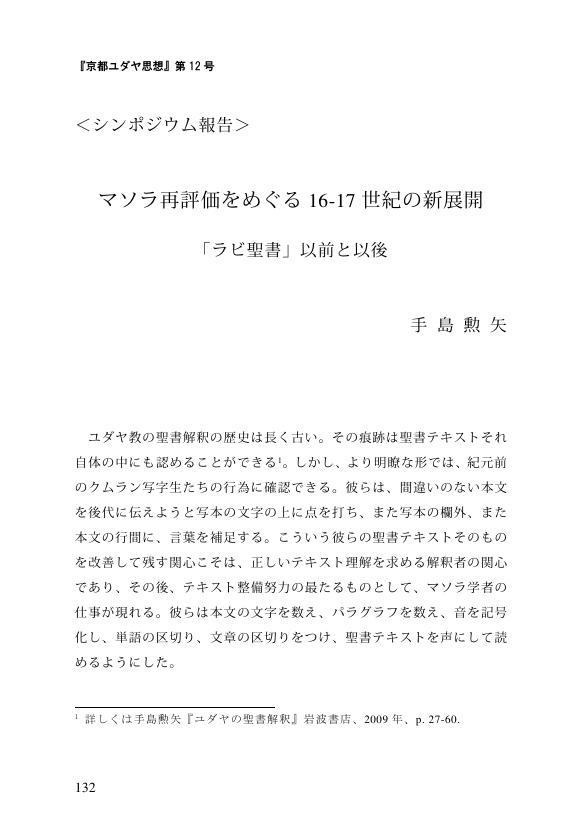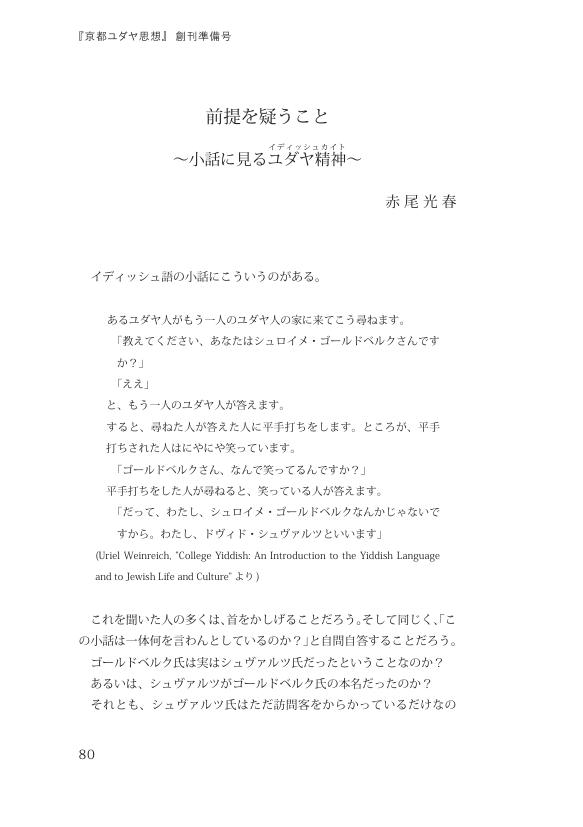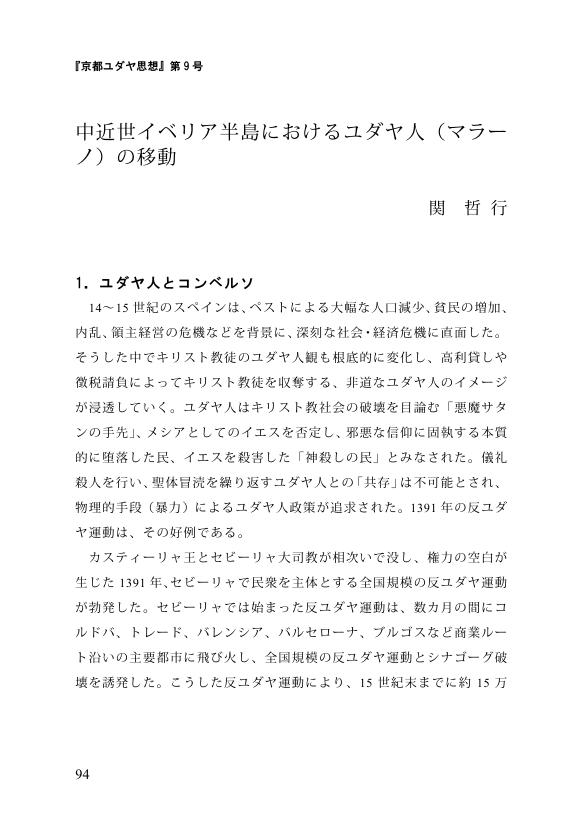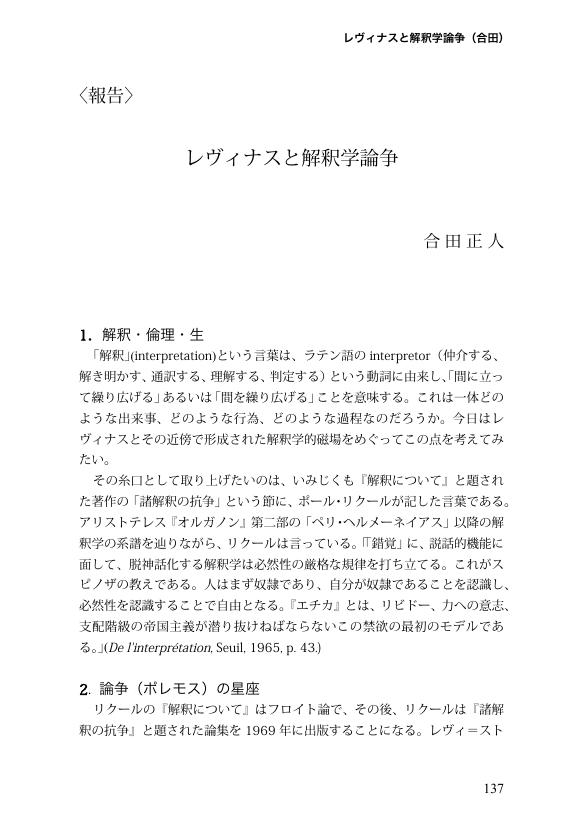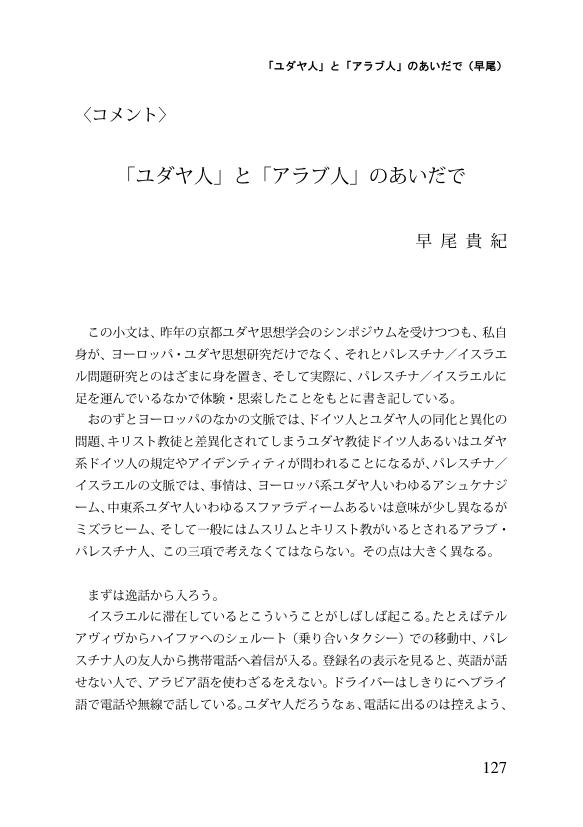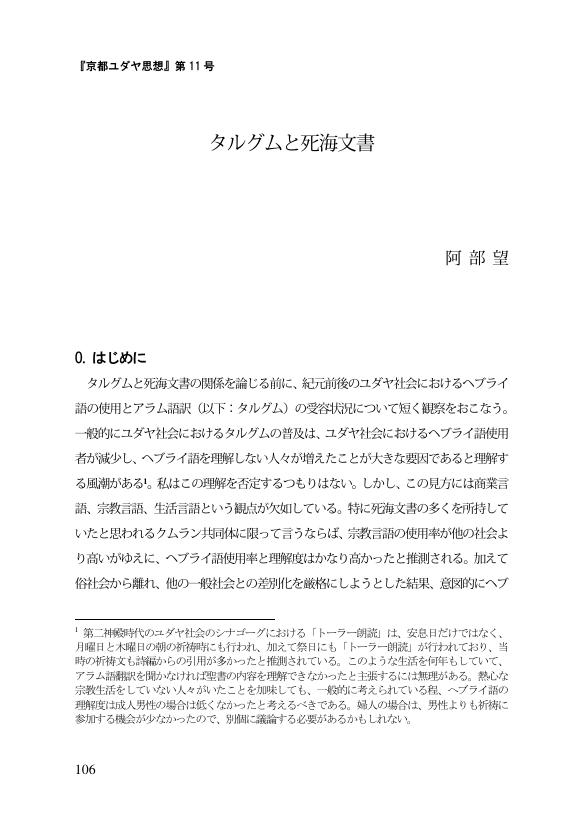7 0 0 0 OA 日本軍政下の上海にユダヤ絶滅計画は存在したか(続) 實吉敏郎・海軍大佐の未公開文書より
- 著者
- 菅野 賢治
- 出版者
- 京都ユダヤ思想学会
- 雑誌
- 京都ユダヤ思想 (ISSN:21862273)
- 巻号頁・発行日
- vol.10, pp.6-35, 2019-06-29 (Released:2022-10-24)
In previous work on this subject, I suggested that the ‘Shibata Affair’ during the summer of 1942 in Shanghai, could have taken place in a completely different way to that described in The Fugu Plan (1979) by Marvin Tokayer and Mary Shwartz and reproduced since then in numerous writings on the Jewish residents in the Far East during the World War II.Shortly after my completing the article (October 2017), a fortuitous coincidence allowed me to discover unpublished documents of the Naval captain Toshiro Saneyoshi (1886-1973), who led the Special Investigation Department in the Naval Attaché's Office in Shanghai from April 1942 to June 1943. His task was nothing less than settling Jewish issues properly in the post-Pearl Habour context. And his diaries, written in Japanese and in English, and the letters to his wife in Tokyo cover the complete range of his Department's activities.Analysis of these newly obtained documents clearly demonstrates that some Shanghai Jewish community leaders seriously tried to abort, not a Josef Meisinger's fictional extermination plan, but a real initiative of forced relocation to a specific area. At the time, Saneyoshi was indeed pursuing this measure along with his two subordinates, Tsutomu Kubota (1895-1975) and Masahiko Sekiya (1904-1994).A critical and multilingual edition of Saneyoshi documents is to be hoped for further in-depth historical research on the relationship between the Shanghai Jewish community and the local Japanese authorities.
5 0 0 0 OA 十字軍とジハード
- 著者
- 中田 考
- 出版者
- 京都ユダヤ思想学会
- 雑誌
- 京都ユダヤ思想 (ISSN:21862273)
- 巻号頁・発行日
- vol.8, pp.102-107, 2017-06-24 (Released:2022-12-09)
5 0 0 0 OA 日本軍政下の上海にユダヤ絶滅計画は存在したか 柴田貢とヨーゼフ・マイジンガーの周辺
- 著者
- 菅野 賢治
- 出版者
- 京都ユダヤ思想学会
- 雑誌
- 京都ユダヤ思想 (ISSN:21862273)
- 巻号頁・発行日
- vol.9, pp.68-90, 2018-06-21 (Released:2022-10-24)
In the exhibition gallery of Sydney Jewish Museum, the images of two Japanese ‘Righteous’ hang next to each other: one is Chiune Sugihara (1900-86) now famous the world over, and the other is Mitsugi Shibata (1910-77) who, in contrast, has remained entirely obscure even to the Japanese public. Much of the literature produced to date on Jewish residents in wartime Shanghai, however, has celebrated Shibata for saving over 20,000 Shanghai Jews from an egregious extermination plan, ostensibly elaborated by S. S. Colonel Josef Meisinger.Far from refuting the humanitarian aspects of Shibata's actions, this article attempts to reconstruct the events in which he was involved in a different way to that of existing works, notably The Fugu Plan (1979) by Marvin Tokayer and Mary Shwartz.Using testimony left by Shibata's widow as well as some diplomatic archives of the Ministry of Foreign Affairs of Japan, the present account will provide a unique insight, from within Japan, into the reality of the ambiguous ‘Shibata Affair’, which took place during the summer of 1942 in Shanghai.
3 0 0 0 OA 聖書における聖戦をめぐって
- 著者
- 勝村 弘也
- 出版者
- 京都ユダヤ思想学会
- 雑誌
- 京都ユダヤ思想 (ISSN:21862273)
- 巻号頁・発行日
- vol.8, pp.79-94, 2017-06-24 (Released:2022-12-09)
3 0 0 0 OA 学者たちとの出会い ユダヤの歴史とともに
- 著者
- 根占 献一
- 出版者
- 京都ユダヤ思想学会
- 雑誌
- 京都ユダヤ思想 (ISSN:21862273)
- 巻号頁・発行日
- vol.13, pp.1-9, 2022-06-25 (Released:2023-06-26)
3 0 0 0 OA 『ユートピアと社会主義』序文
- 著者
- レヴィナス エマニュエル 合田 正人
- 出版者
- 京都ユダヤ思想学会
- 雑誌
- 京都ユダヤ思想 (ISSN:21862273)
- 巻号頁・発行日
- vol.7, no.2, pp.S402-S407, 2019-06-29 (Released:2023-04-13)
2 0 0 0 OA マソラ再評価をめぐる16-17世紀の新展開 「ラビ聖書」以前と以後
- 著者
- 手島 勲矢
- 出版者
- 京都ユダヤ思想学会
- 雑誌
- 京都ユダヤ思想 (ISSN:21862273)
- 巻号頁・発行日
- vol.12, pp.132-160, 2021-12-20 (Released:2023-04-07)
2 0 0 0 OA 前提を疑うこと 小話に見るユダヤ精神
- 著者
- 赤尾 光春
- 出版者
- 京都ユダヤ思想学会
- 雑誌
- 京都ユダヤ思想 (ISSN:21862273)
- 巻号頁・発行日
- pp.80-84, 2010-10-29 (Released:2022-10-25)
2 0 0 0 OA ユダヤ教、キリスト教、イスラーム ペトルス・アルフォンスィ『ユダヤ人との対話』を中心に
- 著者
- 矢内 義顕
- 出版者
- 京都ユダヤ思想学会
- 雑誌
- 京都ユダヤ思想 (ISSN:21862273)
- 巻号頁・発行日
- vol.3, pp.55-80, 2012-12-26 (Released:2022-11-15)
Peter Alfonsi was a Jewish convert in the 12th century Spain and wrote Dialogue against the Jews. This is an anti-Jewish and -Islamic tract by the authority and rational argument.The focus of this paper is to consider his conception of ratio(reason) by dealing with his indicts for Talmudic anthropomorphic interpretation of the Old Law and his critical opinions of Mohammad, Islamic customs and the Qur'an, and his unusual Trinitarian speculation.His conception of reason was based on his unique view of the liberal arts in his Epistola ad peripateticos. Instead of the traditional seven arts, he presented the six arts; dialectic, arithmetic, geometry, physica(medicine), music and astronomy. So in his criticizing of Judaism and Islam, he made full use of logical demonstrations and at the same time, of cosmological, astronomical and medical knowledge of Arabic sciences. This was a radically new polemic for the western intellectuals of the early 12th century. Therefore, this tract was the most influential and widely read one to the 16th century in Western Europe.
2 0 0 0 OA 中近世イベリア半島におけるユダヤ人(マラーノ)の移動
- 著者
- 関 哲行
- 出版者
- 京都ユダヤ思想学会
- 雑誌
- 京都ユダヤ思想 (ISSN:21862273)
- 巻号頁・発行日
- vol.9, pp.94-106, 2018-06-21 (Released:2023-04-03)
- 著者
- 櫻井 丈
- 出版者
- 京都ユダヤ思想学会
- 雑誌
- 京都ユダヤ思想 (ISSN:21862273)
- 巻号頁・発行日
- vol.13, pp.38-66, 2022-06-25 (Released:2023-06-26)
2 0 0 0 OA ヘブライ語聖書~第二神殿時代における「ユダヤ人」
- 著者
- 大澤 耕史
- 出版者
- 京都ユダヤ思想学会
- 雑誌
- 京都ユダヤ思想 (ISSN:21862273)
- 巻号頁・発行日
- vol.13, pp.10-20, 2022-06-25 (Released:2023-06-26)
- 著者
- 後藤 正英
- 出版者
- 京都ユダヤ思想学会
- 雑誌
- 京都ユダヤ思想 (ISSN:21862273)
- 巻号頁・発行日
- no.4, pp.147-154, 2015-03
- 著者
- 伊藤 玄吾
- 出版者
- 京都ユダヤ思想学会
- 雑誌
- 京都ユダヤ思想 (ISSN:21862273)
- 巻号頁・発行日
- pp.62-69, 2010
1 0 0 0 OA レヴィナスと解釈学論争
- 著者
- 合田 正人
- 出版者
- 京都ユダヤ思想学会
- 雑誌
- 京都ユダヤ思想 (ISSN:21862273)
- 巻号頁・発行日
- vol.4, no.2, pp.S137-S146, 2015-03-31 (Released:2022-12-09)
1 0 0 0 OA 「ユダヤ人」と「アラブ人」のあいだで
- 著者
- 早尾 貴紀
- 出版者
- 京都ユダヤ思想学会
- 雑誌
- 京都ユダヤ思想 (ISSN:21862273)
- 巻号頁・発行日
- vol.2, pp.127-131, 2012-03-05 (Released:2022-11-14)
1 0 0 0 OA 世界のための隔たり ブーバーにおける原離隔概念
- 著者
- 田島 卓
- 出版者
- 京都ユダヤ思想学会
- 雑誌
- 京都ユダヤ思想 (ISSN:21862273)
- 巻号頁・発行日
- vol.7, no.2, pp.S10-S37, 2019-06-29 (Released:2022-11-07)
This study examines Buber's unique concept of “Urdistanz” (primordial distance) and tries to show that this concept has been influenced by German philosophers. Philological coincidences reveal that besides referring to Uexküll explicitly, Buber has referred to Scheler and Heidegger implicitly. Buber has used ideas from “Weltoffenheit” (Scheler) and “In-der-Welt-sein” (Heidegger) to form his concept of “Urdistanz”. Therefore, the concept of “Urdistanz” has been formed to explain the close relationship between the being of a human being and the existence of the world as a world.The concept of “Urdistanz” can be detected in section 54 of Ich und Du wherein Buber states that the fundamental duality of the world, whose manifestation for human beings is the duality of Ich-Du/Ich-Es. Buber used the ideas of German philosophers in order to restate the theological description of this section in philosophical terms as the human devotion to the world-creation of God is a critical idea that has prompted him to insist on the close relationship between the world and human being.
1 0 0 0 OA ルターのユダヤ人理解 近年の研究における新しい視点より
- 著者
- 村上 みか
- 出版者
- 京都ユダヤ思想学会
- 雑誌
- 京都ユダヤ思想 (ISSN:21862273)
- 巻号頁・発行日
- vol.9, pp.122-138, 2018-06-21 (Released:2023-04-03)
1 0 0 0 OA タルムードの聖書解釈に込められたユダヤ賢者の実存的関心
- 著者
- 市川 裕
- 出版者
- 京都ユダヤ思想学会
- 雑誌
- 京都ユダヤ思想 (ISSN:21862273)
- 巻号頁・発行日
- vol.4, no.2, pp.S33-S52, 2015-03-31 (Released:2022-11-03)
This paper concerns the historical realities of the Talmudic sages reflected in their midrashic interpretation on the meaning of the Biblical passages in the tractate Shabbat 88 a-b of the Babylonian Talmud. Summarizing the characteristics of the Talmudic discussions in four points following the approaches of E. Levinas, we assume that the sages were deeply concerned with the question whether the Torah was given forcefully by God or was accepted with the total commitment by the Israelites. This question, regarded as the difficult freedom by Levinas, was derived from the two Biblical passages opposing to each other in the Book of Exodus. It was seriously considered by two groups of the sages, firstly by R. Yohanan and the second generation of Palestinian Amoraim and then by Rava and the fourth generation of Babylonian Amoraim. It is highly probable that the attribute of total devotion of Moses was in reality recovered in Rava's commitment to the Torah and that the exegetical response of Rava was substantiated by his existential concern.
1 0 0 0 OA タルグムと死海文書
- 著者
- 阿部 望
- 出版者
- 京都ユダヤ思想学会
- 雑誌
- 京都ユダヤ思想 (ISSN:21862273)
- 巻号頁・発行日
- vol.11, pp.106-121, 2020-12-20 (Released:2023-04-06)



